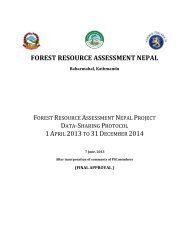Download - FRA Nepal
Download - FRA Nepal
Download - FRA Nepal
Create successful ePaper yourself
Turn your PDF publications into a flip-book with our unique Google optimized e-Paper software.
5. Assumptions and Risks<br />
5.1 Institutional risks<br />
Salary is enormously increasing on the private sector and other ODA projects. The trend is that the younger specialists are<br />
leaving the Government organizations to work for the private sector, and ODA projects. It has happened quite often that<br />
persons with acquired skills in information technology go and work for some other organization and this causes shortage of<br />
human resources. The project should be able to motivate skilled people to stay and work in the project by offering<br />
challenging tasks and good working environment. DFRS needs to designate appropriate staff members to the project to work<br />
as full-time counterparts.<br />
5.2 Technical risks<br />
At the beneficiaries level there is a risk that collecting and processing of data for the <strong>FRA</strong> becomes too technical. It may<br />
happen that the beneficiaries, for instance the district level forestry officers and decision makers cannot adopt the proposed<br />
technology and new practices. Electricity and many other infrastructures related problems limit the use of technical devices.<br />
This risk is diminished by adequate training, proper logistics support and results dissemination. Technically all used<br />
equipment and information management software will be available. However, tailor-made applications and transfer of<br />
personnel always have potential risk for missing institutional memory.<br />
The technical matters will be discussed and decided in the project’s Technical Working Group (under the Project<br />
Management Committee), where technical priorities will be discussed and solved. Most of proposed technical solutions are<br />
already used in <strong>Nepal</strong> and some expertise is already available in the country. Open source solutions and applications will be<br />
used as far as possible.<br />
5.3 Funding and financial risks<br />
The project will be funded by Finnish technical assistance (TA) and the government budget of <strong>Nepal</strong>. The Finnish TA is used<br />
to cover the costs of the international expertise as well as supporting field work of <strong>Nepal</strong>ese staff (travel allowance, logistics<br />
and material support). The imbalance between the salaries of project funded expertise and the salaries of the <strong>Nepal</strong>ese civil<br />
servants exposes a risk of certain degree for the successful implementation of the project.<br />
If project is managed through the <strong>Nepal</strong>ese budgetary system, some financing risks may occur. Many donors have stopped<br />
Red Book funding, because the aid instrument was ineffective due to the political and security situation. The budget<br />
contributed by GoN will be managed by following government system. Funds from Finnish Government would be reflected<br />
in the Red Book; however, the mode of expenses will be direct payment.<br />
5.4 Coordination and security risks<br />
With the several TA experts and part-time staff, the project will operate at the central level and in districts. It sets high<br />
demands for successful coordination of activities. Therefore, good co-operation is needed between the project and<br />
Departments of the Ministry for successful implementation of the project.<br />
In addition, the information exchange among DFRS, DoF, SD and other government agencies, and communication in<br />
forestry related departments need to be improved, in order to avoid unnecessary delays. If the project management<br />
responsibilities are not clear, it is difficult to fully utilize foreign technical expertise and local contracted ICT-know-how.<br />
Availability of appropriate national and international consultant is a low level risk. Timely recruitment of short-term<br />
consultants is essential. In this context, attempts could also be made to outsource the fieldwork to private sector free-lance<br />
field specialists or to use advanced level students who are committed to work several months in the field.<br />
Political environment, peace process, drafting of the constitution and new federal structure can affect administrative<br />
organization of country. However, the results of the project will be based on independent spatial network of sample points<br />
and these can be used to recalculate new results for any new administrative division. The impacts of a weak security situation<br />
in Terai and Eastern Hills may cause delays in data collection. It is possible to reduce this risk through local participation and<br />
partnership programs with Department of Forests and DFOs and other local actors, such as community forest user groups.<br />
There are still some active political groups in various remote areas. Careful consideration and consulting of local partners is<br />
needed before each field campaign.<br />
19





